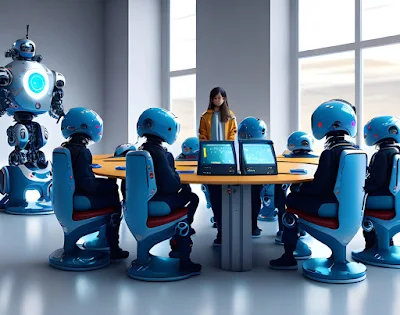Embodied AI: Revolutionizing Healthcare with Robotics and Autonomous Systems
**Introduction: **
Embodied Artificial Intelligence (AI) is reshaping the healthcare landscape and driving innovation.
and usher in a new era of efficiency.
This comprehensive article examines the transformative impact of embodied AI on robotics and autonomous systems in healthcare, with the potential to improve patient care, improve diagnostics, and redefine the role of technology in healthcare.
It emphasizes gender.
**1.Robotics in Surgical Precision: **
Embodied AI has revolutionized surgery by integrating robotic systems into the operating room.
Controlled by AI algorithms, these robots improve surgical precision and enable minimally invasive surgery with faster recovery times.
Surgeons can remotely control or collaborate with robots, providing an unprecedented level of precision in complex medical procedures.
**2.Smart prosthetics and exoskeletons: **
Advances in embodied AI have led to the development of smart prosthetics and exoskeletons.
Equipped with AI-driven sensors and actuators, these devices improve mobility and functionality for people with limb loss or limited mobility.
By integrating AI, these devices adapt to your movements and become more intuitive and responsive.
**3.Personalized medicine and diagnostics: **
Embodied AI will play a central role in the era of personalized medicine.
AI algorithms analyze extensive datasets, including genomic information and patient medical history, and tailor treatment plans to each individual patient.
This not only improves treatment efficacy but also contributes to early disease detection with advanced AI-based diagnostic tools.
**4.Human-Robot Collaboration in Rehabilitation: **
In rehabilitation environments, embodied AI facilitates human-robot collaboration in physical therapy.
AI-powered robots adjust treatment routines in real time based on patient feedback, ensuring a personalized rehabilitation plan.
This collaborative approach accelerates the recovery process and provides valuable support to healthcare professionals.
**5.Remote Patient Monitoring and Telemedicine: **
The integration of embodied AI in healthcare also extends to remote patient monitoring and telemedicine.
AI-powered systems can analyze patient data in real-time, allowing for continuous monitoring and early detection of abnormalities.
This not only improves patient care but also reduces the burden on healthcare facilities, especially in times of crisis.
**6.Emotional Intelligence in Patient Interactions: **
Embodied AI improves the emotional intelligence of robots, allowing them to interact with patients in a more human-like way.
This is especially beneficial in medical settings where compassionate communication is important.
AI-controlled robots can provide companionship, support, and assistance, improving the overall patient experience.
**7. Ethical Considerations and Patient Privacy: **
As embodied AI becomes more prevalent in healthcare, ethical considerations regarding patient privacy and data security are coming to the fore.
To achieve widespread adoption of these technologies, it is essential to balance the benefits of AI-powered healthcare solutions with ensuring the confidentiality of patient information.
**Conclusion: **
Embodied AI is at the forefront of healthcare transformation, offering unprecedented opportunities to improve patient outcomes, improve diagnosis, and redefine the patient-physician relationship.
To do.
As the synergy between AI and robotics increases, we are looking forward to a future in healthcare environments where intelligent and adaptive systems play a key role in delivering personalized and effective care.
However, it is important to consider ethical considerations to ensure that these advances are consistent with the principles of patient-centered and responsible medicine.






No comments:
Post a Comment